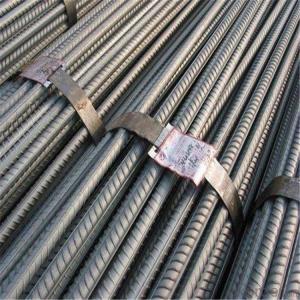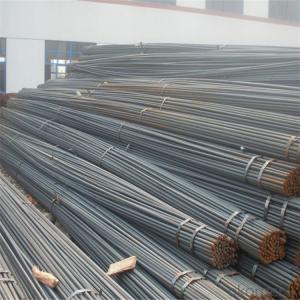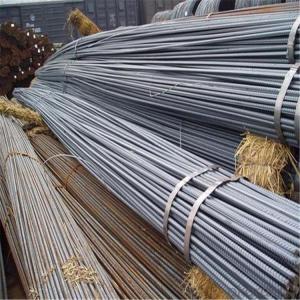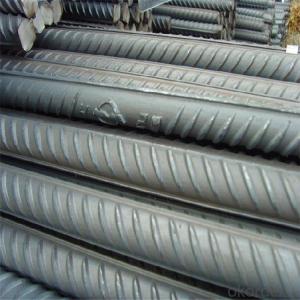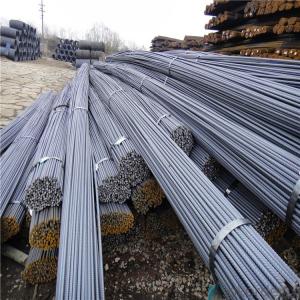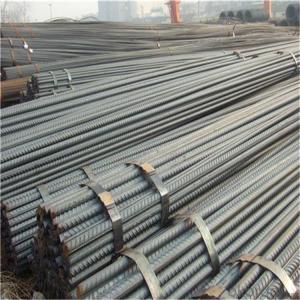Hot Rolled Rebar Screw Thread Steel Bar
- Loading Port:
- Tianjin
- Payment Terms:
- TT OR LC
- Min Order Qty:
- 100 m.t.
- Supply Capability:
- 50000 m.t./month
OKorder Service Pledge
OKorder Financial Service
You Might Also Like
Item specifice
Description of Thread Steel Bar
1, Diameter: 5.5mm-10mm Thread Steel Bar
10m- 40mm Thread Steel Bar
2, Length: 6m, 9m, 12m or customized
3, Standard: GB, ASTM, AISI, SAE, DIN, JIS, EN
OEM technology - send detailed technical parameters for accurate quotation.
2, Produce Process: smelt iron - EAF smelt billet - ESR smelt billet -
hot rolled or forged to get the steel round bar and plate
3, Heat Treatment: annealing, normalizing, tempering, quenching
4, Surface Treatment: Black
5, Quality Assurance: We accept third party inspection for all orders.
You can ask testing organizations such as SGS, BV, etc. to test our products before shipping.
Chemical Composition of Thread Steel Bar
Grade | Technical data of the original chemical composition(%) | |||||
Reinforcing steel bar HRB335 | C | Mn | Si | S | P | B |
≤0.25 | ≤1.60 | ≤0.80 | ≤0.045 | ≤0.045 | >0.0008 | |
Physics Capability | ||||||
Yield Strength(N/cm2) | Tensile Strength(N/cm2) | Elongation(%) | ||||
≥ 335 | ≥490 | ≥16 | ||||
Reinforcing steel bar HRB400 | C | Mn | Si | S | P | B |
≤0.25 | ≤0.16 | ≤0.80 | ≤0.045 | ≤0.045 | 0.04-0.12 | |
Physics Capability | ||||||
Yield Strength(N/cm2) | Tensile Strength(N/cm2) | Elongation(%) | ||||
≥ 400 | ≥ 570 | ≥ 14 | ||||
Products Show of Thread Steel Bar
Company Information
CNBM International Corporation is the most important trading platform of CNBM group.
Whith its advantages, CNBM International are mainly concentrate on Cement, Glass, Iron and Steel, Ceramics industries and devotes herself for supplying high qulity series of refractories as well as technical consultancies and logistics solutions.


F A Q
1, Your advantages?
professional products inquiry, products knowledge train (for agents), smooth goods delivery, excellent customer solution proposale
2, Test & Certificate?
SGS test is available, customer inspection before shipping is welcome, third party inspection is no problem
3, Factory or Trading Company?
CNBM is a trading company but we have so many protocol factories and CNBM works as a trading department of these factories. Also CNBM is the holding company of many factories.
4, Payment Terms?
30% TT as deposit and 70% before delivery.
Irrevocable L/C at sight.
5, Trading Terms?
EXW, FOB, CIF, FFR, CNF
6, After-sale Service?
CNBM provides the services and support you need for every step of our cooperation. We're the business partner you can trust.
For any problem, please kindly contact us at any your convenient time.
We'll reply you in our first priority within 24 hours.
- Q:What are the different heat treatment methods used for special steel?
- There are several heat treatment methods used for special steel, including annealing, quenching, tempering, normalizing, and case hardening.
- Q:How does special steel perform in high-temperature oxidation with sulfur-containing atmospheres?
- Special steel performs well in high-temperature oxidation with sulfur-containing atmospheres due to its enhanced resistance to sulfur attack. The alloying elements present in special steel, such as chromium, molybdenum, and nickel, provide excellent protection against sulfur-induced corrosion and oxidation. This makes special steel an ideal choice for applications where exposure to high temperatures and sulfur-containing atmospheres is a concern.
- Q:What are the properties of titanium alloys?
- Titanium alloys have several properties that make them highly desirable in various industries. Firstly, they have excellent strength-to-weight ratio, which means they are strong and lightweight. This property makes them suitable for applications where strength and durability are required, such as aerospace engineering. Secondly, titanium alloys have high corrosion resistance, even in harsh environments. They form a protective oxide layer on their surface, which prevents them from corroding. This characteristic makes them ideal for marine and chemical processing industries. Thirdly, titanium alloys have a high melting point, allowing them to withstand extreme temperatures without losing their structural integrity. This property makes them suitable for applications in the automotive, defense, and power generation sectors. Furthermore, titanium alloys are biocompatible, meaning they are well-tolerated by the human body and are often used in medical implants and prosthetics. Overall, titanium alloys possess a unique combination of strength, lightweightness, corrosion resistance, high melting point, and biocompatibility, making them highly valuable and versatile materials in various industries.
- Q:How does special steel perform in terms of electrical resistivity?
- Special steel typically has higher electrical resistivity compared to other types of steel. This means that it offers greater resistance to the flow of electric current, making it less conductive.
- Q:What are the requirements for special steel used in mining equipment manufacturing?
- The requirements for special steel used in mining equipment manufacturing typically include high strength and toughness to withstand the harsh operating conditions, excellent wear resistance to endure abrasive materials, good corrosion resistance to resist chemical exposure, and high fatigue strength to withstand repeated loading. Additionally, the steel should have good weldability and machinability to facilitate fabrication processes.
- Q:What are the main characteristics of magnetic steel?
- Magnetic steel, also known as ferromagnetic steel, possesses several key characteristics that make it highly suitable for various industrial applications. Firstly, magnetic steel exhibits a strong magnetic field, which allows it to attract and hold magnetic materials. This property is crucial in the manufacturing of electrical devices, such as motors, transformers, and generators, where the steel is used to create magnetic circuits and enhance the efficiency of electromagnetic processes. Another important characteristic of magnetic steel is its high saturation magnetization, meaning it can reach a maximum magnetic flux density under a given magnetic field strength. This property ensures that magnetic steel can retain a strong magnetic field even when exposed to external forces or fluctuations in the magnetic field. This stability and reliability make it ideal for applications that require consistent magnetic performance. Furthermore, magnetic steel possesses excellent electrical conductivity, which is critical in applications where the steel is used as a core material for electrical circuits. The high electrical conductivity of magnetic steel minimizes energy losses and allows for effective power transmission and distribution. In addition to these properties, magnetic steel also exhibits a high coercivity, which is the ability to resist demagnetization. This characteristic is crucial in applications where the steel is subjected to fluctuating magnetic fields or mechanical stresses, as it ensures that the magnetic properties remain stable over time. Overall, the main characteristics of magnetic steel include a strong magnetic field, high saturation magnetization, excellent electrical conductivity, and high coercivity. These properties make magnetic steel an essential material in various industries, including electrical engineering, power generation, and magnetic product manufacturing.
- Q:What are the applications of high-strength low-alloy (HSLA) steel?
- High-strength low-alloy (HSLA) steel finds applications in various industries such as automotive, construction, and manufacturing. It is commonly used in the production of heavy machinery, bridges, pipelines, and offshore structures due to its excellent strength, toughness, and corrosion resistance. Additionally, HSLA steel is favored in the automotive industry for manufacturing lightweight yet durable components, enhancing fuel efficiency and overall vehicle performance.
- Q:What are the main factors affecting the impact toughness of special steel?
- The main factors affecting the impact toughness of special steel include the chemical composition of the steel, the microstructure and grain size, the heat treatment process, and the presence of impurities or defects in the material. Additionally, the manufacturing process, such as forging or rolling, can also impact the impact toughness of special steel.
- Q:How does special steel contribute to the defense aftermarket industry?
- The defense aftermarket industry heavily relies on special steel to manufacture essential materials for defense equipment and components. Special steel possesses exceptional properties, including strength, durability, and resistance to corrosion and extreme temperatures, making it the preferred choice for producing military vehicles, aircraft, weapons, and defense systems. One significant contribution of special steel to the defense aftermarket industry is its use in armor and ballistic protection. By utilizing special steel alloys, armor plates and panels can be created to withstand high-velocity impacts, providing crucial protection for military personnel and vehicles against enemy fire. These materials offer enhanced protection, reducing the risk of casualties and damage during combat. Furthermore, special steel is essential in the production of aerospace components. Military aircraft are vital for various defense operations, such as reconnaissance, surveillance, and combat. Special steel alloys ensure the safety, reliability, and performance of these aircraft by manufacturing critical components like landing gear, engine parts, and structural elements. Special steel's resistance to corrosion and extreme conditions also makes it suitable for constructing naval vessels and submarines. These assets operate in harsh marine environments, facing saltwater, extreme temperatures, and constant mechanical stress. Special steel alloys with high-strength properties and corrosion resistance are utilized in building ship hulls, propeller shafts, and critical components, ensuring longevity and operational effectiveness. Moreover, special steel contributes to the defense aftermarket industry through its role in the supply chain. The production and maintenance of defense equipment and components often require specialized machinery and tools, which are made from special steel. The availability of these materials is crucial for maintaining a robust defense industry and enabling efficient production and maintenance of defense systems. In conclusion, special steel plays a vital role in the defense aftermarket industry by providing the necessary materials for producing high-performance, reliable, and durable defense equipment. Its unique properties contribute to the safety, effectiveness, and longevity of military vehicles, aircraft, weapons, and naval vessels, ultimately enhancing the capabilities of defense forces worldwide.
- Q:What are the different surface treatment methods used for special steel?
- Some of the different surface treatment methods used for special steel include galvanizing, electroplating, powder coating, heat treatment, and nitriding. Galvanizing involves applying a protective zinc coating to prevent corrosion. Electroplating uses an electrical current to deposit a layer of metal onto the surface of the steel, improving its appearance and corrosion resistance. Powder coating involves spraying a dry powder onto the steel and then baking it to create a durable and attractive finish. Heat treatment involves subjecting the steel to high temperatures and then cooling it rapidly to alter its properties, such as hardness or toughness. Nitriding is a process of diffusing nitrogen into the surface of the steel to improve its hardness, wear resistance, and corrosion resistance. These surface treatment methods are used to enhance the performance, durability, and aesthetic appeal of special steel.
1. Manufacturer Overview |
|
|---|---|
| Location | |
| Year Established | |
| Annual Output Value | |
| Main Markets | |
| Company Certifications | |
2. Manufacturer Certificates |
|
|---|---|
| a) Certification Name | |
| Range | |
| Reference | |
| Validity Period | |
3. Manufacturer Capability |
|
|---|---|
| a)Trade Capacity | |
| Nearest Port | |
| Export Percentage | |
| No.of Employees in Trade Department | |
| Language Spoken: | |
| b)Factory Information | |
| Factory Size: | |
| No. of Production Lines | |
| Contract Manufacturing | |
| Product Price Range | |
Send your message to us
Hot Rolled Rebar Screw Thread Steel Bar
- Loading Port:
- Tianjin
- Payment Terms:
- TT OR LC
- Min Order Qty:
- 100 m.t.
- Supply Capability:
- 50000 m.t./month
OKorder Service Pledge
OKorder Financial Service
Similar products
New products
Hot products
Related keywords
